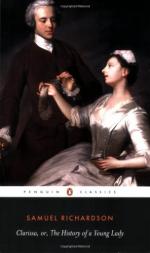MADAM,
I have the honour of dear Miss Howe’s commands to acquaint you, without knowing the occasion, ’That she is excessively concerned for the concern she has given you in her last letter: and that, if you will but write to her, under cover as before, she will have no thoughts of what you are so very apprehensive about.’—Yet she bid me write, ’That if she had bit the least imagination that she can serve you, and save you,’ those are her words, ’all the censures of the world will be but of second consideration with her.’ I have great temptations, on this occasion, to express my own resentments upon your present state; but not being fully apprized of what that is—only conjecturing from the disturbance upon the mind of the dearest lady in the world to me, and the most sincere of friends to you, that that is not altogether so happy as were to be wished; and being, moreover, forbid to enter into the cruel subject; I can only offer, as I do, my best and faithfullest services! and wish you a happy deliverance from all your troubles. For I am,
Most excellent young lady,
Your faithful and most obedient servant,
CH. Hickman.
LETTER XIII
Mr. Lovelace, to John Belford,
Esq.
Tuesday, may 2.
Mercury, as the fabulist tells us, having the curiosity to know the estimation he stood in among mortals, descended in disguise, and in a statuary’s shop cheapened a Jupiter, then a Juno, then one, then another, of the dii majores; and, at last, asked, What price that same statue of Mercury bore? O Sir, says the artist, buy one of the others, and I’ll throw you in that for nothing.
How sheepish must the god of thieves look upon this rebuff to his vanity!
So thou! a thousand pounds wouldst thou give for the good opinion of this single lady—to be only thought tolerably of, and not quite unworthy of her conversation, would make thee happy. And at parting last night, or rather this morning, thou madest me promise a few lines to Edgware, to let thee know what she thinks of thee, and of thy brethren.
Thy thousand pounds, Jack, is all thy own: for most heartily does she dislike ye all—thee as much as any of the rest.
I am sorry for it too, as to thy part; for two reasons—one, that I think thy motive for thy curiosity was fear of consciousness: whereas that of the arch-thief was vanity, intolerable vanity: and he was therefore justly sent away with a blush upon his cheeks to heaven, and could not brag—the other, that I am afraid, if she dislikes thee, she dislikes me: for are we not birds of a feather?
I must never talk of reformation, she told me, having such companions, and taking such delight, as I seemed to take, in their frothy conversation.
I, no more than you, Jack, imagined she could possibly like ye: but then, as my friends, I thought a person of her education would have been more sparing of her censures.




